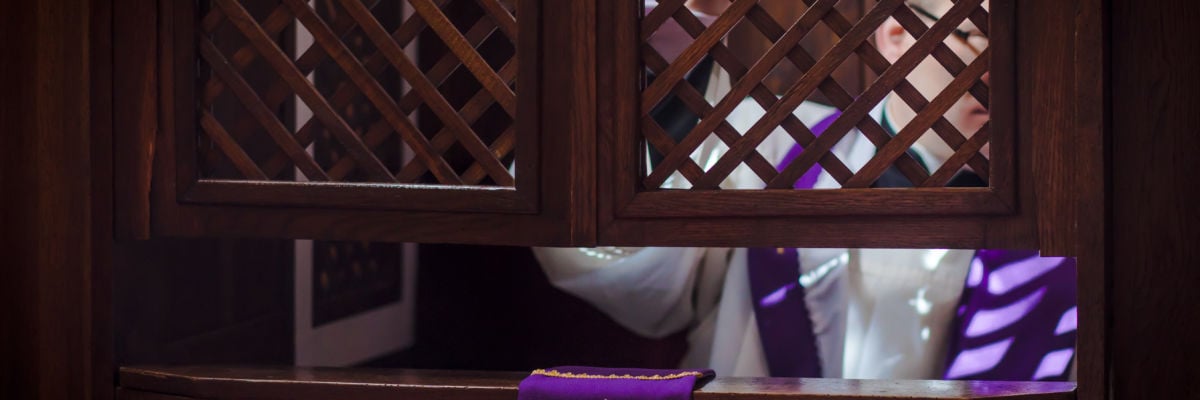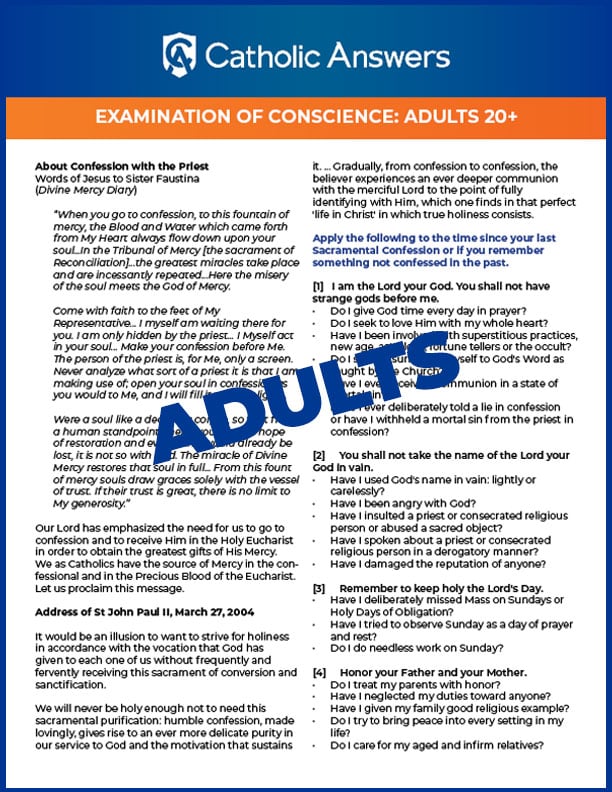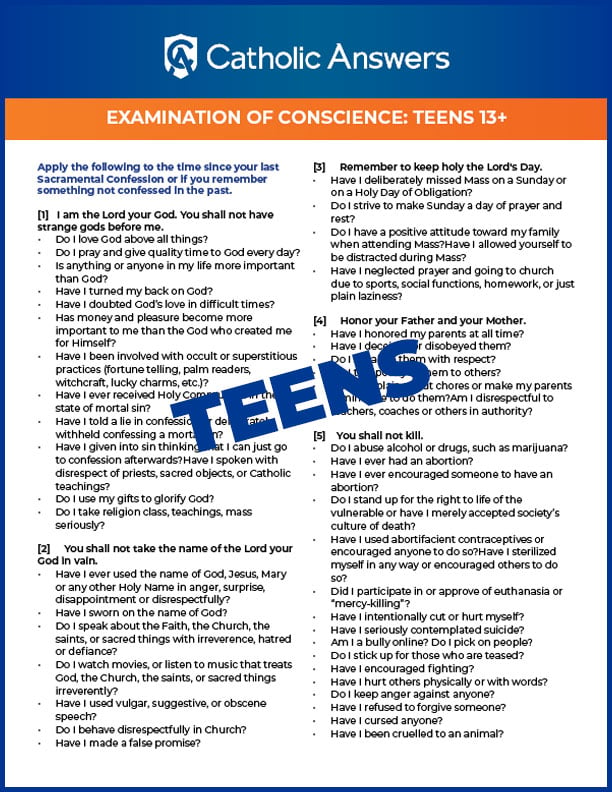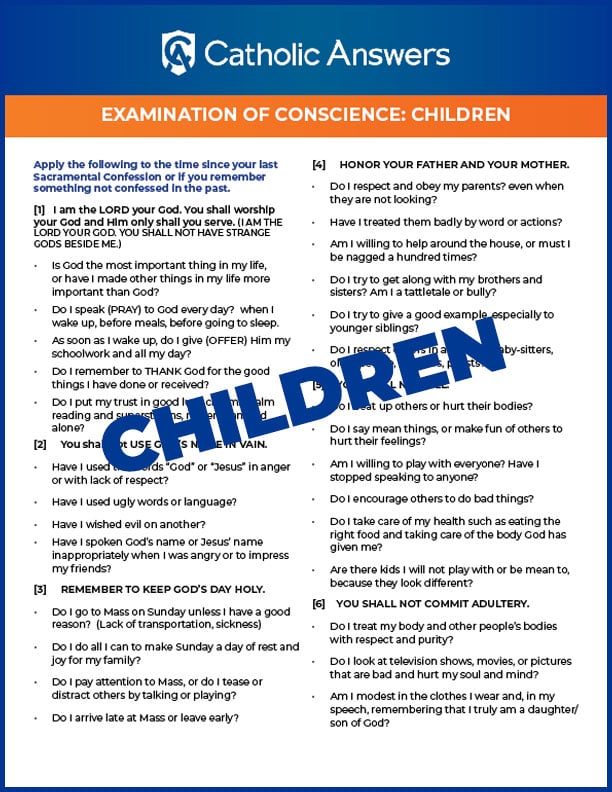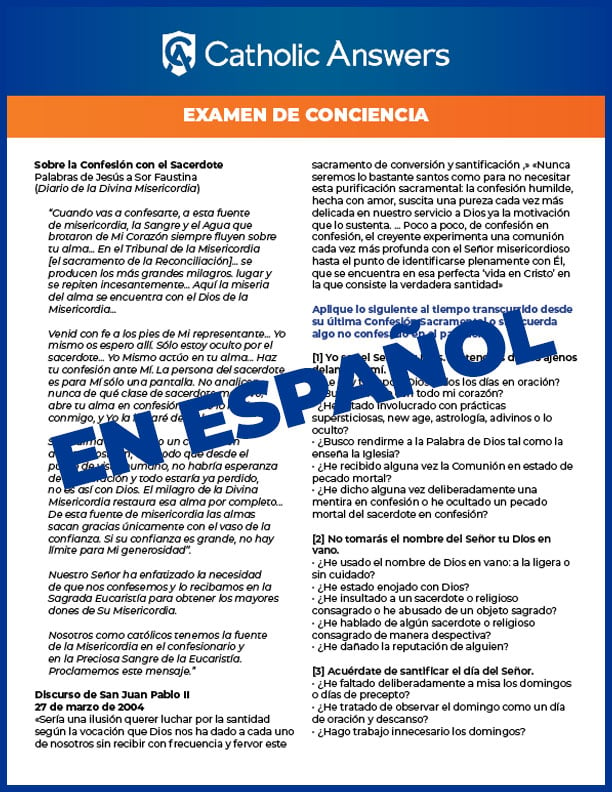
What is an Examination of Conscience?
An Examination of Conscience, a cornerstone of Catholic life, is a reflective exercise in which you assess your thoughts, words, and deeds in light of the Church’s moral teachings to prepare yourself well for the sacrament of confession. This introspective examination serves as a means of spiritual growth, reconciliation, and renewal.
No matter a person’s age, an Examination of Conscience is relevant and beneficial in preparing for confession. For adults, it offers an opportunity to evaluate your commitment to our Lord Jesus Christ and his Church. This further fosters personal holiness in helping you gain a deeper love for the Lord, your loved ones, and your neighbor. Teens benefit by developing a conscience informed by timeless moral principles (Rom. 2:14–16), not the zeitgeist (spirit of the age), so that they can better navigate the challenges of adolescence and young adulthood. Even children can engage in simplified examinations, nurturing their understanding of right and wrong while cultivating virtues from an early age.
What Is Mortal Sin?
Not all sins are equal. The Church distinguishes between venial sins, which wound our relationship with God, and mortal sins, which destroy it. Mortal sin cuts us off from sanctifying grace, and must be reconciled through the sacrament of confession before one can worthily receive Holy Communion.
For a sin to be mortal, three criteria must be met (CCC, 1857):
- Grave Matter: The act itself is seriously wrong, such as murder, adultery, theft, or deliberate rejection of God.
- Full Knowledge: The person knows that the act is gravely sinful.
- Deliberate Consent: The person freely chooses to commit it despite knowing its gravity.
If any of these three conditions is lacking, the sin is not mortal but venial. However, venial sins still weaken our spiritual life and can dispose us toward more serious sin. If one is not in a state of mortal sin, they should still participate in the Sacrament of Reconciliation on a regular basis. This helps ensure a properly formed conscience.
Understanding mortal sin is essential when making an examination of conscience. By sincerely identifying whether we have committed mortal sin, we approach confession with love and humility, ready to be restored to God’s sanctifying grace.
A Catholic Examination of Conscience
“If we undertake the examination of conscience with greater faithfulness, perhaps we will realize that what we sometimes consider a stumbling block is rather a rock we can step on. Knowledge of our sin helps us to rise.” -Saint Teresa of Calcutta

How to Make a Good Confession?
The first step is making a thorough examination of your conscience. By carefully considering the guidance provided by the Ten Commandments, the Beatitudes, and other relevant Scripture, you can identify areas where you may have fallen short of God’s will and acknowledge your sins with genuine contrition. A sincere examination of conscience not only prepares you for the sacrament of confession, but also helps you develop a deeper awareness of your spiritual state and a genuine desire for repentance. Through this practice, you can approach the sacrament with humility, sincerity, and a firm resolve to amend your life. Furthermore, receiving the abundant graces and mercy God offers through the sacrament of reconciliation.
How to do an Examination of Conscience?
Wondering how to conduct an Examination of Conscience effectively? Look no further! We’ve assembled a straightforward, four-step guide to ensure your examination is fruitful and thorough.
Four Steps to a Good Examination of Conscience:
Step One – Pick an examination of conscience. When discerning which examination of conscience to utilize, it’s prudent to consider factors such as age, marital status, and your particular station in life. For instance, resources tailored to specific age groups—such as adults, teens, or children—can provide a person more relevant guidance and thus resonate more deeply in their hearts. Likewise, considerations on whether you’re married, single, clergy, or religious can help you better focus on the particular challenges—and needed virtues—in living out your vocation. This includes differing emphases on one’s moral obligations and spiritual disciplines. Thus, in selecting an examination of conscience, it’s wise to seek materials that offer guidance tailored to your unique circumstances and spiritual needs.
Need to find an examination of conscience that is tailored to you? The search ends here! Download and use any of our free pdfs below to prepare for your next confession:
Examination of Conscience for Adults
Examination of Conscience for Teens
Examination of Conscience for Children
Examination of Conscience in Spanish
Step Two – Find a place to reflect and pray. – Find a quiet and comfortable space to reflect, whether at home and/or at church while waiting to enter the confessional. Turn off your phone and allow yourself to be free from all distractions.
Step Three – Pray for a successful Examination of Conscience. – Before embarking on your Examination of Conscience, it is important to cultivate humility and openness to God’s grace. Begin with prayer, invoking the Holy Spirit to illuminate your conscience and guide your reflections. Approach this spiritual exercise with sincerity and honesty, recognizing your ongoing need for conversion and spiritual growth. You can use the prayer below if you don’t have another prayer you already use:
“Come Holy Spirit into my soul, enlighten my mind that I may know the sins I ought to confess, and grant me your grace to confess them fully, humbly, and with a contrite heart. Help me to firmly resolve not to commit them again. O Blessed Virgin, Mother of my Redeemer, mirror of innocence and sanctity, and refuge of penitent sinners, intercede for me through the Passion of your Son, that I may obtain the grace to make a good confession. All you blessed angels and saints of God, pray for me, a most miserable sinner, that I may repent of my evil ways, that my heart may henceforth be forever united with yours in eternal love. Amen.”
Step Four – Go through your Examination of Conscience of choice.
“Be ashamed when you sin, not when you repent.” – St. John Chrysostom

Related Content
Videos
Articles
- How to Defend the Sacrament of Confession
- Confession: A Pain that Ends in Joy
- Conscience and Communion


